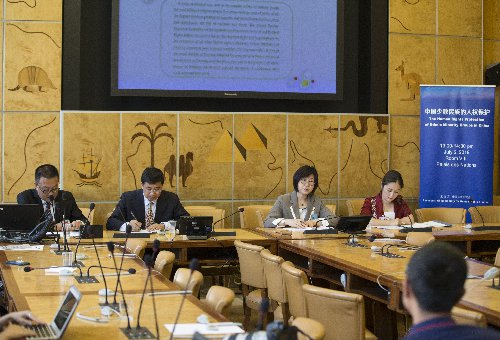HOME >> CHINA
HRW report reflects hypocrisy
By Chen Qingqing and Hu Yuwei Source:Global Times Published: 2020/1/16 0:33:40
NGO judges other nations by ignoring facts: expert

Experts attend a side-event on China's human rights protection of ethnic minorities amid the 41st session of the UN Human Rights Council in Geneva, Switzerland, July 2, 2019.
Criticizing China for "suppressing" human rights is the card that the West has been playing for decades. This reflects the hypocrisy and deep ignorance of arrogant Western elites who cannot give an objective assessment of other countries' situations, analysts said on Wednesday, in response to the latest report of nongovernmental organization (NGO) Human Rights Watch (HRW) which deemed China as a global threat to human rights development.
In its 335-page World Report 2020, the New York-based NGO claimed that China is now a global threat to human rights. Kenneth Roth, executive director of HRW, claimed that the country is also using its "growing economic clout to silence critics and to carry out the most intense attack on the global system for enforcing human rights since that system began to emerge in the mid-20th century."
Roth was banned from entering Hong Kong on Sunday, about a month after the HRW was sanctioned by the Chinese central government for their "horrible activities" in instigating the months-long riots in the Hong Kong Special Administrative Region (HKSAR).
The NGO, which claims it does not receive funds from the government, releases human rights reports every year, evaluating the global system for protecting human rights. However, many of its officials and members are former US federal government officials, and the NGO has been using its right to speak to export the ideological tendency, Chinese analysts said.
"To judge other countries at will by ignoring the facts is their way of doing things," an analysts close to a government-related think tank asked for anonymity, said. Meanwhile, another NGO, Freedom House, said in its latest report that Chinese media's overseas expansion posed "serious implications for the survival of open, democratic societies."
The Chinese Foreign Ministry said on Wednesday that HRW's China-related remarks, including its report, are devoid of facts and paint white as black, and that there is no need to discuss it. "These two organizations have been viewing China from distorted views for a long time. Their China-related comments always ignore facts with no objectivity," Geng Shuang, spokesperson of Chinese Foreign Ministry, said at a routine press conference. "The state of the human rights situation in China is in the best of times," he noted.
Some China-related topics HRW highlighted in its 2020 report have appeared in previous reports, including criticism over so-called repressions of Uygur people and the erosion of HKSAR's "freedom."
Its 2020 report has also adopted the same biased way of depicting "old stories" with new arguments. For example, in the Hong Kong chapter, HRW claimed that a large number of protesters acted peacefully and the police used excessive force, intentionally ignoring the legitimacy of police law enforcement.
This is not the first time HRW pointed its finger at other countries' internal affairs, coming up with reports filled with biased views and false evidence. It ignored cases of police beating African-Americans to death in the US or the infamous abuse of detainees at the Guantanamo Bay detention camp, according to a letter jointly released in May 2014 by more than 130 scholars, mostly from the US, criticizing the HRW. Singapore's Ministry of Law also refuted the NGO criticism of proposed fake news laws in 2019 in Singapore.
The letter, calling on HRW to close its revolving door to the US government, noted that many members of the HRW are former CIA agents and former US officials. The organization's standard on human rights is in accordance with US diplomatic policies and interests, thus damaging its credibility and independence.
"It also reflects the lack of oversight of NGOs in international law. For example, what criteria does HRW use to evaluate human rights in other countries?" the analyst said, noting that it seriously undermines the joint efforts of other countries in the field of human rights.
Politically driven
Chinese analysts also noted that the funding and membership of the NGO linked it close to the US government, although it claims to be nongovernmental, and its goal is to work for the country's national interests.
A graduate of Yale Law School and Brown University, Roth used to serve as a federal prosecutor, whose perception of China's human rights is embedded with hostility and political bias.
"They've been watching and criticizing other countries based on their understanding and idea of the West's concept of human rights. China has its own human rights concept, formulated on our social, economic and cultural background. But the Chinese concept was often disregarded by those NGOs," another anonymous expert told the Global Times on Wednesday.
Human rights include, first and foremost, the right to life, subsistence and development, the Xinhua News Agency said in a commentary in 2019. When HRW criticized China's Xinjiang policy, it turned a blind eye to the region, which used to fall victim to violent terrorist attacks that has killed innocent people but has been developing into a peaceful and prosperous place.
Its perception of China's human rights status also reflects the hypocrisy and arrogance of provocative Western elites, analysts said.
Though these NGOs claim to be politically neutral, it is impossible for them to completely ignore the political background and stance of Western countries, He Zhipeng, a professor of international human rights and legal education at Jilin University in Northeast China, told the Global Times.
"They usually take Western culture as the basis or ideological fortress, and always stand on the basis of the Western human rights ideology to observe and criticize other countries, while China's socio-economic and cultural background is often unheard in their investigation," he said.
Wang Yabin contributed to the story
Posted in: DIPLOMACY